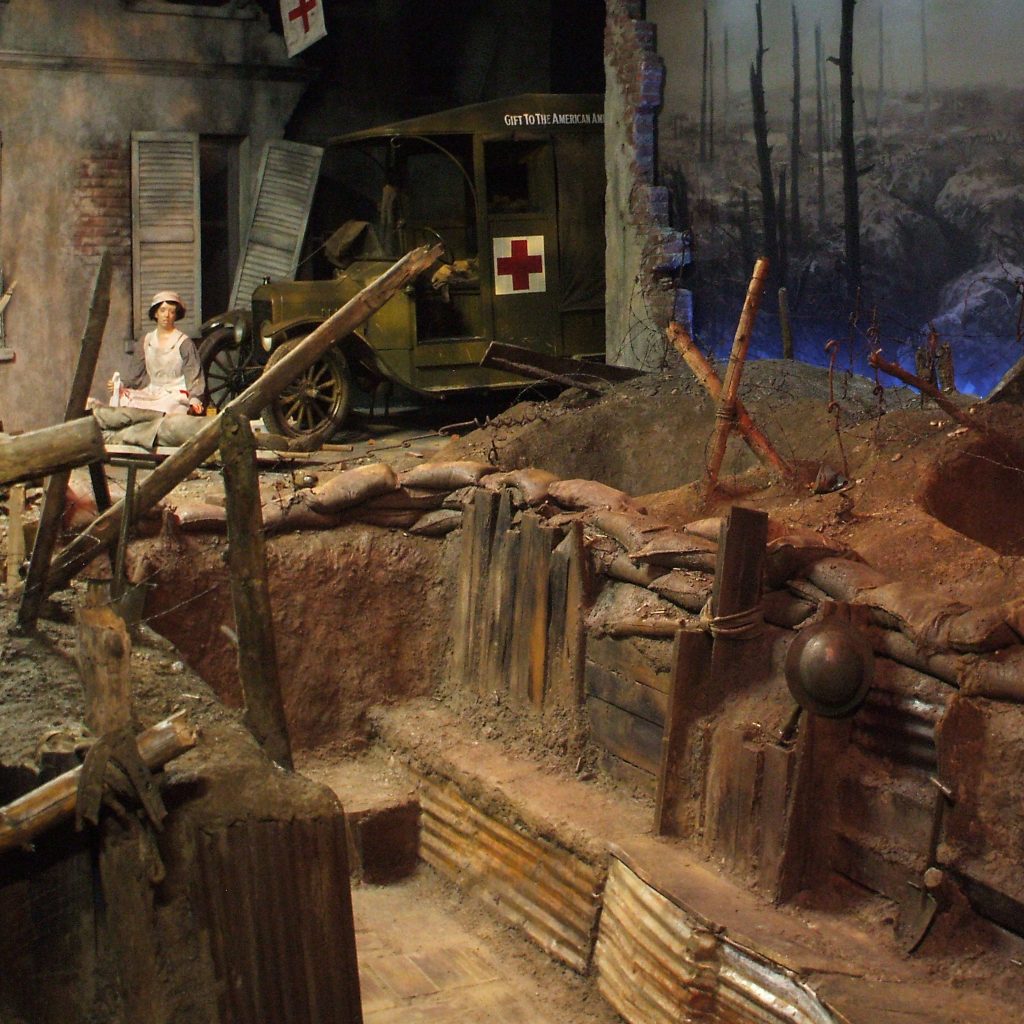WWI Trench Experience

M1917 6-Ton Tank – USA | LIGHT TANK
Ford Model T Ambulance – USA | AMBULANCE
German 1917 Maschinengewehr 08 – GERMANY | MACHINE GUN
World War I began in 1914 after a series of disputes that reached a tipping point when Gavrilo Princip, a Bosnian Serb Yugoslav nationalist, assassinated Austro-Hungarian Archduke Franz Ferdinand. Austria attacked Serbia, supported by Germany. Russia supported its ally Serbia against Austria and Germany, which next attacked Russia’s ally France, invading through Belgium. Britain then declared war on Germany, bringing its world empire into the fight, from India to Australia to Canada. Bulgaria and the Ottoman empire joined the Central Powers of Austria and Germany, while Italy (1915) and the United States (1917) eventually joined the Allied powers, which numbered 28 by the end of the war in 1918.
H.G. Wells thought it might become the ‘war to end all war,’ a hope echoed by Woodrow Wilson. It did not. Instead, it unleashed horrors of modern war and social and political destruction that we live with still. WWI was one of the deadliest conflicts in history with an estimated 9 million combat deaths, and 13 million civilian deaths as a direct result of the conflict. World War I was a significant turning point in the political, cultural, economic, and social climate of the world. The war and its immediate aftermath sparked numerous revolutions, uprisings and the shattering of four empires: German, Ottoman, Austrian, and Russian. It began the breakup of all the old empires, including the worldwide British and French empires. Its major effect was to set the stage for the calamity of WWII, which was even more destructive. Together, the two world wars finished off all the old European imperial systems, leaving many quarrels over territory in successor nations and memories of wartime horrors that still lead to military conflict today.
The setting of the immersive WWI Trench Experience is the bleak, frightening, battle-torn landscape of Saint-Mihiel, France. The WWI battle of Saint-Mihiel was a major clash along the western front fought from September 12th to 15th, 1918. It was the first battle to involve the American Expeditionary Force led by General John J. Pershing. The attack at Saint-Mihiel was part of the plan by Pershing to have the Americans break through the heavily trenched and fortified German lines and capture the city of Metz. It was the first offensive launched primarily by the United States Army.
The main narrative character in the WWI Trench Experience represents nurse Helen Dore Boylston from New Bedford, Massachusetts. She graduated as a nurse from Massachusetts General Hospital in 1915 and sailed for France to serve in the First World War with the Harvard Medical Unit, as part of the British Expeditionary Force. She nursed the wounded at a front-line field hospital specializing as a nurse anesthetist and reaching the rank of captain. Boylston wrote about her experiences in a book Sister: The War Diary of a Nurse, which was published in 1927. Some of Helen Dore Boylston’s excerpts from her diary are recreated in enthralling dialogue and presentation.



